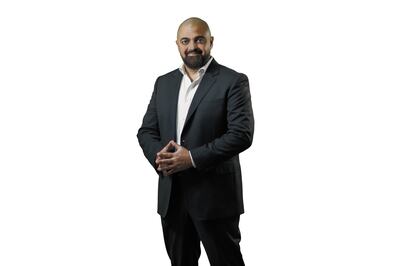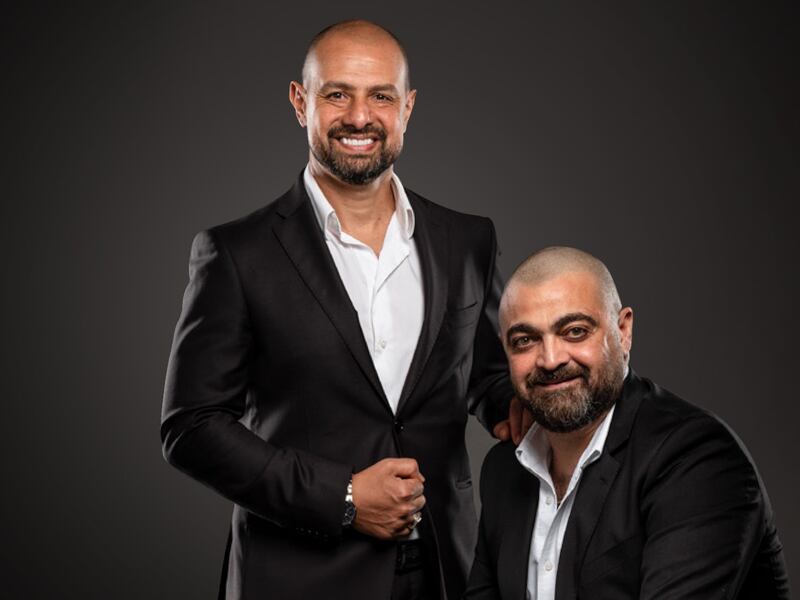Ibrahim Kamel and Ihab Fikry saw the potential of education technology in the region long before Covid-19 sparked a boom in demand for online learning.
The pair, who were seasoned executives at Exxon Mobil, got the idea for their online video learning business after Mr Fikry, who holds a PhD in marketing, wanted to design a digital course on a management topic he had researched. He approached Mr Kamel for help but his partner saw a wider business opportunity.
“I thought why don't we develop a business [instead of just a single course] and have all subject matter experts in all fields to teach people, because there is a gap in the Arab world for continuous learning,” Mr Kamel says.
“More than 90 per cent of the youth [in the region], they don't feel comfortable when they attend an English course [though they can understand the language]. We thought we saw an opportunity … and a space [that] was empty.”
The e-learning market in the Middle East is expected to grow to more than $1.5 billion by 2023, at a compound rate of 15.2 per cent a year from $558.3 million in 2016, according to Research Nester. But Arabic speakers, who make up nearly 5.2 per cent of internet users, according to Statista, are a largely untapped part of the market.
Mr Kamel and Mr Fikry set up Almentor in 2016 in a bid to fill what they saw as an obvious gap in the market. The company, which derives its meaning from a combination of Arabic and English words “al” and “mentor” – al means “the” in Arabic – produces videos on a wide spectrum of topics, ranging from parenting, health and lifestyle to engineering, marketing, sales and digital skills, among others.
Almentor’s business model was inspired by other global e-learning platforms for professional courses such as Coursera, Udemy and Lynda.com. But the start-up has adapted its model to suit the region’s requirements, Mr Kamel says.
“We are a combination of all of them and added some more features to be able to fit ... because the Middle East market is not as huge as the European and American market,” he says.
While a number of these e-learning companies in the US and Europe operate as marketplaces, Almentor went a step further to include video production for experts on its platform to make the experience more appealing to users.
“Not every expert is going to know exactly how to transform his material or his content for an online business. So, we have a huge team of instructional designers working under the content department who are co-ordinating with all experts and working on the material to transform the content to suit online,” Mr Kamel says.
The company also decides the kind of topics it wants to showcase on its platform and even the type of experts it would like to feature. Almentor then approaches the experts and films and develops videos for them.
The start-up, which has more than 12,000 educational videos and a million users, generates revenue from customers who pay for the content they consume. It is also planning to offer a subscription model soon, the co-founder says.
Almentor also works with instructors on a revenue sharing model, where experts are paid based on the amount of content they generate and how many views it receives.
Another avenue of revenue is partnerships with enterprises that buy bulk access to some of Almentor’s content for their employees. Currently, the company has 80 such deals in place.
Having its own media and technology team means that Almentor can customise content for companies or even governments, Mr Kamel says.
The company has existing deals with the governments of Egypt, Saudi Arabia and the UAE, as they look to boost digital learning content amid the pandemic. Such projects are often specialised to meet clients' requirements, Mr Kamel adds.
“Each ministry and each project has its own required user experience that is different from others. So we develop the technology and provide the whole solution … starting from the content building and all material development till you have the final version of the learning content ready to be hosted on the platform.”
Initially, Mr Kamel and Mr Fikry pooled their savings to set up Almentor and gradually built its team to five by the end of 2016. They had brought in other people at the start, who later became silent partners, and also secured support from an angel investor. Two years later, the duo also opened a branch office in Egypt to cater to the rising demand for professional learning in the region, bringing its total head count to more than 180 people spread across its offices in Egypt and the UAE.
Since starting the business, the founders have managed to triple Almentor's revenue every year, Mr Kamel says.
But things haven't all been plain sailing for the executives-turned-businessmen. When they launched Almentor, EdTech had yet to take off and learning from online platforms was still a foreign idea to many Arabic speakers. Users often asked how learning could occur if “there is no interaction with the instructor”, he adds.
But the Covid-19 pandemic catapulted its operations to a new level, breaking down barriers it had previously faced. New user numbers on Almentor in the first three to four days at the beginning of movement restrictions last year were equal to what the start-up had achieved in the previous three years, Mr Kamel says.
It also led to a much broader acceptance of EdTech in the Middle East, with more governments recognising its value, the co-founder adds.
Investors have also stepped up their interest. In May, the company raised $6.5m in a late stage funding round (Series B) from Paris-based venture capital fund Partech with participation from Sawari Ventures, Egypt Ventures and Sango Capital, bringing the total funding it has raised so far to $14.5m.
Mr Kamel and Mr Fikry hope to use the proceeds from the latest funding round to build their in-house expertise.
“Mainly to improve the development, content and marketing. We have an ambitious plan for that. Most spending will be on these three pillars,” Mr Kamel says.
Almentor, which currently has users from more than 70 countries, also has some videos in French and English and provides subtitles in these languages on Arabic videos so that multilingual speakers can make use of these. The executives plan to add more languages in the future but the focus will clearly be on Arabic speakers in the near term.
“We believe our role will not be limited to the region,” Mr Kamel says, explaining his ambitions to build Almentor into a global player within the e-learning industry for Arabic speakers.
In terms of user numbers, he has a fixed goal.
“We plan to have 10 million users by 2025.”
Q&A with Ibrahim Kamel, COO and co-founder of Almentor

What skills have you learnt from setting up Almentor?
I have learnt a lot. I was working in a multinational company and I had taken all courses that were available for employees there. But in the last five years I have learned even more. More than skills, I gained know-how about technology and about fundraising. I also learned to work under severe pressure.
What other start-up do you wish you had started?
If it wasn’t Almentor, I would not have resigned from the global company I worked for. I would have just retired from there. The impact this [company] would make is what matters. Ihab and I were lucky to be [part of] the 5 per cent of the Arab youth to join a multinational and receive a lot of training. I got this opportunity, but what about the rest of the youth in the region who didn’t have the same chance? I respect all other business models and I see their value. But helping others improve is fantastic.
Any advice to upcoming entrepreneurs?
This is not just for entrepreneurs but to all: success does not come easily. If you want to make an impact it requires huge effort and dedication. Perseverance and hard work are a must. You have to work extremely hard to succeed and keep the success for a long time.
COMPANY PROFILE
Name: Almentor
Year started: 2016
Based: UAE/Egypt
Employees: 180+
Amount raised: $14.5m
Investors: Partech, Sawari Ventures, Egypt Ventures, Sango Capital and an angel investor







